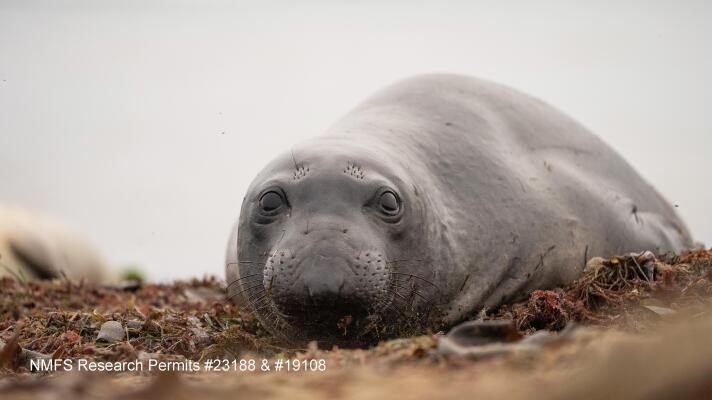Latest Episodes
All
-
All
-
Changing Seas Season 17
-
Changing Seas Season 16
-
Changing Seas Season 15
-
Changing Seas Season 14
-
Changing Seas Season 13
-
Changing Seas Season 12
-
Changing Seas Season 11
-
Changing Seas Season 10
-
Changing Seas Season 9
-
Changing Seas Season 8
-
Changing Seas Season 7
-
Changing Seas Season 6
-
Changing Seas Season 5
-
Changing Seas Season 4
-
Changing Seas Season 3
-
Changing Seas Season 2
-
Changing Seas Season 1
Scientists work to unravel the cause of the fish spinning phenomenon in the Florida Keys.
Episode:
S17
E1703
|
26:42
Scientists collaborate with elephant seals to study their life cycles and ocean health.
Episode:
S17
E1704
|
26:42
In Playa Hermosa locals unite to protect waves, restore habitats, and save sea turtles.
Episode:
S17
E1701
|
26:46
Scientists in Madeira study the impacts of plastics on whales and dolphins.
Episode:
S17
E1702
|
26:46
Experts study southern sea otters to ensure their longtime survival on California’s coast.
Episode:
S16
E1604
|
26:42
Marine archaeologists uncover a Roman shipwreck on Croatia's Adriatic Coast.
Episode:
S16
E1601
|
26:42
Florida scientists make remarkable discoveries about whitespotted eagle rays.
Episode:
S16
E1602
|
26:42
Islanders restore Maui's watersheds through traditional Hawaiian wisdom.
Episode:
S16
E1603
|
26:42
Knowledgeable fishers collaborate with scientists to keep sharks abundant.
Episode:
S15
E1502
|
26:42
Amid shipwrecks and shifting sands, Bermuda’s corals offer clues to climate resilience.
Episode:
S15
E1503
|
26:42
Researchers and citizen scientists document the fascinating lives of seashells.
Episode:
S15
E1501
|
26:42
Researchers brave the Arctic’s cold and dark to reveal the mysteries of the Polar Night.
Episode:
S15
E1504
|
26:42
Experts study declines in the number of humpbacks migrating between Alaska and Hawaiʻi.
Episode:
S14
E1401
|
26:42
Scientists study the body size and health of humpback whales across their migratory cycle.
Episode:
S14
E1402
|
26:42
Experts are working to conserve and restore the Puget Sound’s declining kelp forests.
Episode:
S14
E1403
|
26:42
Florida’s gentle giants are dying in record numbers.
Episode:
S14
E1404
|
26:42
Scientists employ creative solutions to restore and reconnect Florida’s mangroves
Episode:
S13
E1304
|
26:47
The deep-sea submersible Alvin brings explorers to extraordinary places.
Episode:
S13
E1303
|
26:47
Scientists study salt marshes along scenic coastlines in the South.
Episode:
S13
E1302
|
26:42
Scientists team up with anglers to study the survival rates of the fish.
Episode:
S13
E1301
|
26:42
Scientists study what makes certain corals more resilient than others.
Episode:
S12
E1204
|
26:53
Scientists monitor penguin populations and study the animals’ interaction.
Episode:
S12
E1203
|
26:42
Scientists study the devastating impacts of the Deepwater Horizon oil rig disaster.
Episode:
S12
E1202
|
26:42
Scientists set out to uncover the mysteries of blue holes.
Episode:
S12
E1201
|
26:42
Experts study the purpose of a male humpback whale's song.
Episode:
S11
E1104
|
26:42
Stony Coral Tissue Loss Disease is devastating Florida’s fragile coral reef.
Episode:
S11
E1103
|
26:42
Discover the Cordell Bank, a magical underwater island few people have ever heard of.
Episode:
S11
E1101
|
26:42
Scientists work to understand what causes toxic algal blooms.
Episode:
S11
E1102
|
26:47
Scientists work to save crocodiles through research and conservation.
Episode:
S10
E1003
|
26:42
Scientists study tarpon, bonefish and permit to better understand their behaviors.
Episode:
S10
E1004
|
26:42
Modern technology is making it possible to correlate dolphin sounds and behavior.
Episode:
S10
E1001
|
26:43
Deep underwater, on a shipwreck near Key West, lives a tiny potential new threat.
Episode:
S10
E1002
|
26:42
Scientists experimant to see if giant manta rays are impacted negatively by microplastics.
Episode:
S9
E904
|
27:13
Changes to the ocean environment affect the way carbon is cycled through the seas.
Episode:
S9
E903
|
27:13
Discover ways to increase fish production in a sustainable manner.
Episode:
S9
E901
|
27:18
Lake Okeechobee, once the blue heart of Florida, now has putrid mats of blue green algae.
Episode:
S9
E902
|
27:13
Visit the remote Pacific, the islands of Maug - a natural laboratory for scientists.
Episode:
S8
E803
|
26:43
Discover what lives beneath the Blue Heron Bridge in Florida.
Episode:
S8
E804
|
26:43
Scientists take advantage of manatee gatherings to study them.
Episode:
S8
E802
|
26:43
Some scientists are suggesting that ctenophores are the oldest sea animals.
Episode:
S8
E801
|
26:43
Extras
Scientists collaborate with elephant seals to study their life cycles and ocean health.
Preview:
S17
|
4:43
Changing Seas Season 16 - Official Trailer
Preview:
S16
|
3:28
Changing Seas Season 16 - Official Trailer
Preview:
S16
|
2:51
Changing Seas Season 16 - Official Trailer
Preview:
S16
|
5:30
Changing Seas Season 16 - Official Trailer
Preview:
S16
|
3:09
Amid shipwrecks and shifting sands, Bermuda’s corals offer clues to climate resilience.
Preview:
S15
|
4:49
Researchers brave the Arctic’s cold and dark to reveal the mysteries of the Polar Night.
Preview:
S15
|
3:53
Knowledgeable fishers collaborate with scientists to keep sharks abundant.
Preview:
S15
|
4:06
Researchers and citizen scientists document the fascinating lives of seashells.
Preview:
S15
|
3:16
Scientists study the body size and health of humpback whales across their migratory cycle.
Preview:
S14
|
4:04


















































